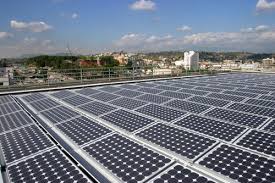
Electric utilities are in big trouble. Investment analysts and industry executives are both using terms like “utility death spiral” and “failing utility business model” to describe how energy generated by residential solar units is threatening the future existence of grid-based electrical service.
Utilities are fighting back. They’re trying to eliminate government incentives that currently make installing residential solar units more affordable. It’s a very dumb and short-sighted response.
When a combination of technology and consumer preferences made cell phones another way to get in touch, major landline-owning telephone companies didn’t fight the trend. They got into the cell phone business. Today, when solar cell technology is developing so rapidly, its costs dropping so dramatically, and consumer affection for solar so obvious, electric utilities should go the same route. Not fight a solar future. Take steps to get a big piece of that future.
Properly viewed, residential solar isn’t a dangerous competitor of electric utilities. It’s a natural adjunct to their present electricity supply operations. Getting involved here guarantees that no matter the mix of electrical generation in years to come, centrally produced or residential sourced (i.e. distributed), utilities will profit.
Changing the utility business model from totally grid-based to a grid and distributed solar-based model is the obvious solution to the industry’s present market challenges. Indeed, it’s really the only long-term solution.
How might an electric utility get into the residential solar business? There’s no one answer to this question. No template at present to follow. But actually manufacturing and installing solar units would certainly not be required. Rather, deals of one sort or another would likely be cut with companies already in the field.
The advantages an electric utility would enjoy in any such arrangement are considerable. It already has direct and long-standing contacts with all potential solar customers via the electric service it currently provides. It can fund its residential solar involvement at very advantageous terms because it is able to borrow at near zero interest rates. It can take a long-term view on realizing profits, unlike many companies that must perform better every quarter.
Environmentalists should also cheer a move by utilities into the residential solar market. Utilities have the financial and marketing clout to hasten greatly acceptance and implementation of solar. And there’s the political factor as well. It’s far better to have a very powerful ally with well-established political contacts backing distributed solar power for the sake of its own profits, than a very powerful enemy fighting solar at every turn.
While utilities and environmentalists would both benefit from the former’s move into residential solar, there would be one big loser here. The fossil fuel industry. The more solar that generates electricity in homes, the less utilities will have to spend burning fossil fuels to feed their grids.
Residential solar isn’t the enemy of electric utilities. Acting in short-sighed ways that only benefit fossil fuel suppliers is the real threat to future utility profits.
(Michael Silverstein is a former senior editor with Bloomberg’s flagship Markets magazine. Kay Wood is an environmental writer and graphic novelist.)










